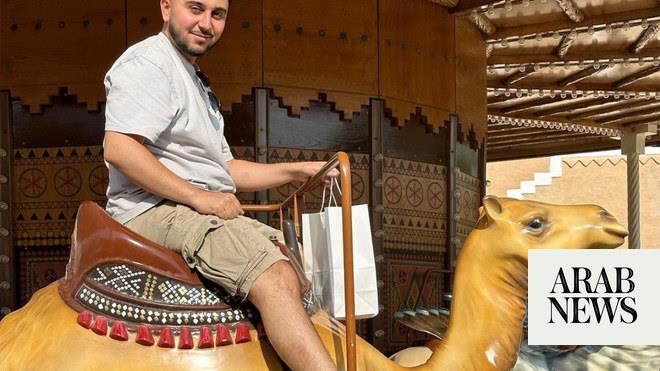
n the cover of his eponymous 2019 debut album, AJ Tracey was already pronouncing himself the greatest of all time, or GOAT in rap parlance, by posing with an actual goat. He used two for the shoot so neither would get lonely. What happened to his animal friends? “I donated them to a farm in Hounslow,” he says. “They’re pygmy goats, so they’re way smaller, but all the other goats there are scared of them. They run tings.”
The goats are more widely symbolic, then. The 27-year-old Tracey has come from a poor background to end up running things, dominating British rap’s mainstream as a fully independent artist. Known for his party tunes and his gorgeous, low vocal delivery (there is a Reddit post titled “AJ Tracey’s voice could slide the knickers off a nun”), his funny and boastful bars flit glossily over any beat: UK garage, grime and drill, but also Caribbean soca (his dad is from Trinidad) and US trap and R&B. He has even folded in a country music influence.
His debut is certified gold (100,000 UK units), and five of his singles have gone platinum (600,0000), one of those twice over: the glorious summer anthem Ladbroke Grove. Tracey is up for two Brit awards next month, British male and British single; he actually crops up twice in the latter category, on his own track Rain with Aitch and his guest spot alongside Stormzy on Headie One’s Ain’t It Different. He is indifferent about the awards, which were once out of touch with Black British music (“It’s flattering and I’m grateful, but they don’t really measure cultural impact”). Still, he says he would like Headie to win.
It is cold but sunny in west London, and Tracey – real name Ché (after the Argentinian revolutionary, Ché Guevara) Wolton Grant – has arrived in his PA’s back garden, tall in a blue puffa jacket, hands burrowed deep in his pockets, his publicist’s tiny dogs dancing excitedly around his ankles. When he settles into a chair, he speaks in assured, lengthy but thoughtful monologues, and is incredibly polite; every time he swears he says “excuse my language”.
We discuss his impending second album, named Flu Game after the basketball match when Michael Jordan improbably overcame food poisoning to lead the Chicago Bulls to victory in game five of the 1997 NBA finals. Partly, he confirms, he is framing himself as being on Jordan’s level in his respective field: “I think I’m the best rapper in the game.” Alongside mic partners such as Dave, Headie, Aitch and so many more, Tracey has helped British rap evolve into the country’s dominant pop-cultural force, and says he now wants to develop an organic relationship between the UK and US scenes. But in spite of all his self-confidence and success, Tracey is still subject to insecurities.
Their cause might be an ugly duckling complex. “I was chubby, short and misunderstood,” he says of his childhood. On the album track Perfect Storm he references “girls trynna air [dismiss] me in school, now they’re hollering”. During our interview he talks at length about people who doubted him, and how much he loves revenge: “People who shat on me years ago? I’ll never forget – I’m crossing off names.” There are multiple lyrics asking romantic partners to “prove you love me like you say”, but he brushes off any suggestion that he is especially suspicious of women.
“I’m suspicious of everyone, more men than women,” he says. “But when I was younger, girls didn’t show me attention and now, because I’ve done well, I can’t know if a girl likes me because of who I am or because I’ve got money or my looks. But I’m a 27-year-old man, I can admit that most of the things I say about ‘prove you love me’ are about my own insecurities, rather than anything to do with her.” He is now happily in a long-term relationship, and says that lyrically the record would probably be very different – and a lot more sexual – if he was still single.
Flu Game is also about more generally overcoming the odds in a situation that he feels is stacked against him, a young mixed-race Black man raised by his single mother in Ladbroke Grove, where, even for London, the discrepancy between rich and poor is damning: “The Queen lives round the corner but [people] can’t afford electric,” he says.
Although Tracey was previously associated with #Grime4Corbyn and has expressed interest in the Green party, he is jaded about how impactful party politics actually is for communities like his: “Labour is not actually here for us either, they’re just better than the Tories.” But he keeps up to date with the news (“Everyone who’s alive right now will not remember a stupider decision than Brexit”), and like many other public figures during the pandemic, he has used his platform to raise money for the NHS. Political lyrics are mostly absent on Flu Game, although on the track Bringing It Back he does shout out Marcus Rashford for his work on free school meals – and mocks Boris Johnson for his miserliness on the issue.
Even if he does not write about current affairs, Tracey is feeling the strain of the past year, and says he and his friends have struggled with their mental health during the pandemic. “I employ countless people,” he says. “I’ve got friends to look after, my family – so if I take an L [loss], everyone takes an L. I feel a lot of pressure.”
It started building a decade ago when Tracey began uploading music on SoundCloud under the moniker Looney or Loonz, changing his name when he decided to commit to music. It helps having a pseudonym, he says, because “there’s a mental heaviness that comes with being AJ Tracey because my life is everyone else’s”. When he’s just Ché, he can relax.
He was initially known for grime, the UK rap style that flourished in the early 2000s and again in the early 2010s. He scowls good-naturedly at the mention of Thiago Silva, his gargantuan 2016 collaboration with another of the UK’s most lauded rappers, Dave (it had a second flush of fame after the teenager “Alex from Glastonbury” did AJ’s verses in a viral festival performance). Fans still clamour for a part two, especially after Dave teased that they’d done a track named after another footballer, Kylian Mbappé.
“It was a long time ago,” Tracey says. “And also, sorry, but it was a grime beat, and grime is not really lit any more. It’s not what it used to be, and it’s their fault because [people in the grime scene] don’t like change. I was in there, I was open to change, I changed and I’m doing well. They did not want to change and it’s just crabs in a barrel. They don’t want to see anyone do better than themselves; it’s a horrible culture and I really don’t like it. I will not be making any more grime music … unless [scene veterans] P Money or D Double E asked me to.”
Tracey is at the forefront of a younger generation in UK rap who can bounce effortlessly between styles without feeling restricted by tribalism, an ambitious shaping of the zeitgeist that earns him comparisons to artists such as Drake, who has similarly skated across genres. “I’m not interested in making music people think they want, I’m making the music they need,” he says. But a decade in the scene also makes him an elder statesman; he recently joined TikTok and says it makes him feel old, but “you’ve gotta get with it or be a boomer”.
We talk about drill music, the most innovative and exciting UK rap style right now, and how its often nihilistic and aggressive lyrics have been censored by the Metropolitan police, and used in court as evidence against MCs charged with criminal offences. Under the terms of a criminal behaviour order, Tracey’s partner on Bringing It Back, Digga D, has to run all his lyrics past the police before he can record them.
“I don’t preach to anyone about changing their lyrics,” Tracey says. “I started off making very violent, aggressive music, because I was angry, I was poor. I had my weapon with me wherever I was, and thankfully that’s not what it’s like for me any more, but that’s what it was, so that’s what my music sounded like. So I understand these kids. If that’s your reality, that’s what you’re gonna rap about. And I find it confusing when fans – predominantly white fans – get gassed [excited] with these songs, then suddenly think these artists are horrible when they’re arrested for doing these crimes.”
This takes us to the question of authenticity in lyrics full stop. Throughout Flu Game there are references to “banana clips”, “Glockies” and “working white” – slang for weapons and selling drugs on the street, all of which is surely pretty far removed from his lifestyle now. “I’m obviously not going to incriminate myself, but I’m not all the way out of the streets,” he replies. “Some of my friends and family are still doing what they need to do. I don’t like lying, so even if I’ve spiced it up a little bit, everything in my lyrics is always from the truth. And my friends wouldn’t let me go in the booth and start lying. I’m not leaving that stuff out, because it’s part of my truth, even if my life is mainly nice things now.”
Another of his lyrical tropes is bragging – he even makes fun of it on Flu Game’s opening track Anxious, with the line “AJ Tracey’s such a dickhead, all he do is boast” – and the album does contain a lot of boasting about girls, partying, possessions. “I feel like I deserve to brag,” he says. “I’ve worked hard for what I have, and no one believed I was going to get it.”
Tracey’s career has spanned a decade in which UK rap has become the mainstream, and he has been an intrinsic part of that. But he does not want to outstay his welcome, and is already talking about retiring. “I’m in the middle of my prime window,” he says, “And I just think when I reach 31, I’ll be done with rap. Maybe I’ll start managing artists, building artists, mentoring, being a stockbroker, who knows. But I only have a limited time to affect the landscape. I feel like I already have, and I see this younger generation coming through who I know I’ve impacted, and I love that. I think I’ve shown you can do what you want, how you want, and there’s still room for you. But there’s more I want to do. You should never get stuck in a moment.”
Although he mentions dreaming of a No 1 album, and his disappointment when one of his videos only got a couple of million views, Tracey insists he is not interested solely in numerical goals. He cites advice from Skepta, one of grime’s originators. “He said it’s not good to have a solid end goal: you complete it and want the next thing, it’s not fulfilling. So I don’t want to sound like a hippy, but my goals are spiritual, mental and emotional fulfilment. I want to feel like I’ve changed people’s lives.”
AJ Tracey’s self-released album Flu Game is out now. The Brit awards take place on 11 May
This article was updated on 16 April to correct the spelling of Tracey’s name: Ché Wolton Grant, not Walton.












